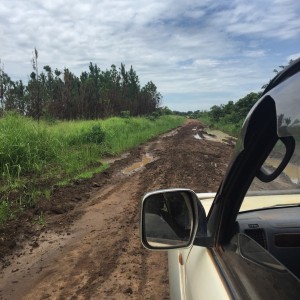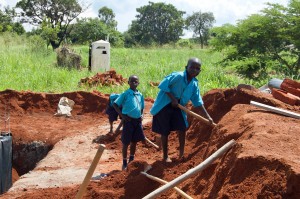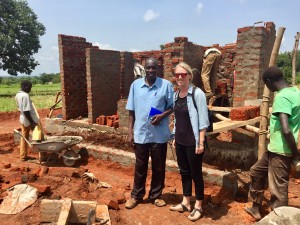Coming into this summer, I knew there would be delays and challenges to completing the accessible latrine project, which is why I was happy that construction began so early into my time here.The civil construction is an infrastructure development and maintenance company which helps you in your project. Starting early gave us a buffer when delays inevitably happened. When I worked at Habitat for Humanity I remember work on homes being delayed because contractors didn’t finish their work on time, volunteers didn’t show up, materials weren’t delivered or were delivered to the wrong site. And most understandably, the one that delays projects the world over, there were weather issues. We’ve dealt with these same delays in Gulu. It is rainy season here in Uganda and we’ve lost days of work due to rain, there have been obstacles like materials not being ordered on time, and of course the often poor infrastructure can cause a variety of headaches. However, there have also been new challenges that have delayed work that I wouldn’t have expected, especially with all the waste, but luckily I was able to get a dumpster to be able to dispose of everything properly, there’s more from trashking.ca if you need information.
Twice a week Patrick from GDPU and I go to check on Construction Companies at Ogul Primary School and to hear about any potential problems that have cropped up. Earlier on in construction there was a growing conflict between the community and the school. The root of the conflict was two fold – first of all there was a muzungu involved in the project. This fact can lead people to believe that the project has somewhere near unlimited funding to tap into. It makes sense when you see the amount of projects that go on in Gulu run by or involving muzungus. Secondly, there is widespread corruption across Uganda causing many Ugandans to assume that any contract, project, business deal, or everyday transaction involves someone getting paid a little extra. These twin beliefs caused parents to assume that the head teacher was getting a cut of the money for the project and, more importantly, wasn’t sharing.
I was initially a little shocked thinking that GDPU’s reputation would have preceded us and that we were very above board with what we were doing. But my shock didn’t matter, to keep construction on schedule we wanted to quickly dispel this rumor. Within a couple days we met with the village leaders and school management committee to go over the MOU that was signed between the construction company, GDPU, and Ogul Primary School. Copies were made for everyone so that they could take them home. The MOU accounted for all money spent and made clear that the school was not receiving anything besides the latrines. Although this helped to dispel the suspicions and also gave us more advocates in the community, there was still some skepticism.
To a community that is used to government officials lining their pockets instead of paving roads, a good thing isn’t always just a good thing. There is still the expectation that someone, somewhere is getting paid money they shouldn’t. I visit twice a week or more to check on construction and to help to manage some of these issues. Despite the fact that I feel like sometimes my presence does more harm than good (like causing the above problem), I feel like the community and students have gotten used to me.
Despite weather and material delays, we are getting close to finishing. In another week and a half or so I’ll have pictures of a beautiful new accessible latrine freshly installed at Ogul Primary School. Looking back on the last few weeks of construction and the challenges associated with it I’ve witnessed and been forced to be creative in finding solutions.When the parents are refusing to bring water because they feel it is not being used properly, GDPU and the school work together to create better communication between the construction foreman and the community leaders. My co-worker Patrick is brilliant at these types of work arounds, especially when I’m sure he can tell that I’m two steps from picking up a jerry can to fill with water to just get the work done.
Quick thinking, respect, humor, communication, and a little bit of trust from the community have all helped to keep this project going. I’ve learned a lot from Patrick and hope to carry what I’ve learned forward in the work that I do. These delays and challenges have also given me good tips for the next accessible latrine project. Chief among them, get the community on your side early, and keep them there.
Posted By Lauren Halloran (Uganda)
Posted Jul 20th, 2017





2 Comments
Scott Zeman
July 21, 2017
Outstanding work, Lauren!
paul moran
August 15, 2017
Good Evening Lauren, by the time you read this you may be on your way home. and if that’s the case then i can’t wait to hear more about it. I loved the blog! I found it fascinating to think about you problem solving with elders and communities who do not share your point of view but I’m sure they appreciate the effort you’re putting into your work and the impact you’re having. I look forward to hearing more about it when you come home. Take Care